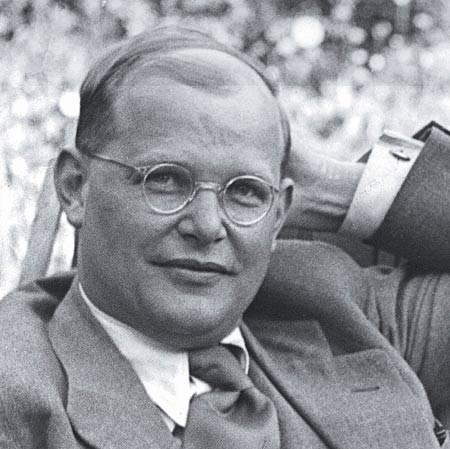From Dietrich Bonhoeffer in Tegel prison, to his fiance Maria von Wedemeyer.
—–
12 August 1943
My Dearest Maria,
After sending off my last letter to you, I was suddenly afraid that my Tegel address on the envelope might make trouble for you in the village. Although I can almost hear you laugh out loud at the idea – and I look forward to hearing you laugh – I don’t think such matters should be treated lightly. It really isn’t necessary for you to be subjected to village gossip about your fiance. And so, to preclude any such possibility, I didn’t write to you again but asked my parents how you felt about it. Today, however, your dear letter arrived, and I simply can’t remain silent. But please, next time tell me how I’m to write to you in the future. I won’t write again until I hear.
So now to your letter. You can’t possibly imagine what it means to me, in my present predicament, to have you. I’m under God’s special guidance here, I feel sure. To me, the way in which we found each other such a short time before my arrest seems a definite indication of that. Once again, things went “hominum confusione et dei providentia (according to man’s confusion and God’s providence).” It amazes me anew every day how little I have deserved such happiness, just as it daily and deeply moves me that God should have put you through such an ordeal this past year, and that he so clearly meant me to bring you grief and sorrow, so soon after we got to know each other, to endow our love with the proper foundation and the proper strength. Moreover, when I consider the state of the world, the total obscurity enshrouding our personal destiny, and my present imprisonment, our union – if it wasn’t frivolity, which it certainly wasn’t – can only be a token of God’s grace and goodness, which summon us to believe in him. We would have to be blind not to see that. When Jeremiah said, in his people’s hour of direst need, that “houses and fields [and vineyards] shall again be bought in this land,” it was a token of confidence in the future. That requires faith, and may God grant it to us daily. I don’t mean the faith that flees the world, but the faith that endures in the world and loves and remains true to that world in spite of all the hardships it brings us. Our marriage must be a “yes” to God’s earth. It must strengthen our resolve to do and accomplish something on earth. I fear that Christians who venture to stand on earth on only one leg will stand in heaven on only one leg too.
I’m thoroughly in favor of your pastor marrying us, but the way. In these matters I think would should always to the most obvious thing. That’s more important than any personal preference.
So now you’ve got the house full of people. How much I would have liked to see you running the household at this time! Your mother wrote me such a nice letter again, telling me all kinds of things. Please thank her very much indeed; I know what a sacrifice if must be for her to find the time to write to me. But there’s no greater pleasure in this place than getting letters from people. One rereads them innumerable times so as to share in their lives.
It’s a cloudy, rainy day outside, a perfect accompaniment to my fruitless wait for the situation to resolve itself. But let us never forget how much we have to be thankful for, and how much good we experience even so; I have only to think of you, and all the little shadows on my soul disperse. So let us continue to be really patient for the rest of the time we’re compelled to wait, and not waste a single hour grousing and grumbling. From God’s standpoint, this time of waiting is immensely valuable; much depends on how we endure it and on whether we need not feel ashamed, later on, of having failed to recognize these months of testing as a gift from God. I’m convinced that our love and our marriage will derive eternal strength from this time of trial. So let us wait, with and for each other, until our wedding day dawns. It won’t be much longer, my dear, dear Maria!
Please give my love to your mother and your brothers and sisters. Is it Lutgert who was killed in action? You must all be very sad. Please remember me to his wife. Good-bye, dearest Maria, and may God preserve us and our families.
Your Dietrich, who looks forward from one letter to the next, embraces you!
*I have cited it in the sources below, but I owe much of the inspiration and information for this post to Dr. Stephen Nichols book The Reformation.
—–
It is common in matters of Reformation Church History to primarily speak of these great figures and martyrs of its time: Luther, Calvin, Zwingli, Bullinger, Beza, Cranmer, Knox, Cromwell, Bunyan, etc. Do you notice one thing in common with all of these names? It is not that they’re all White Europeans or that they had epic beards; no, the trait all of these names have in common are that they all belong to men.
Did you know that there are great heroines of the Reformation? While fewer in number their heart, bold speech and mighty actions equal, rival and often tower over the men of their time. There is one woman in particular whose actions warm my heart, stir my affections for Jesus and stand out as a mighty figure in church history.
But before we can address this great heroine of the Reformation, we must first take a step back in time to tell the soap opera tale of a certain English king and his ill-suited Queens – all seven of them.
King of Queens
King Henry VIII was a king known for his devout and persistent Roman Catholic faith. He was not only a king, but was known for being something of a theologian; in 1521 he refuted Martin Luther and defended Roman Catholic theology in a book entitled The Defense of the Seven Sacraments. The pope at the time, Leo X, praised Henry and gave him the title of “Defender of the Faith.” So long as Henry was on the throne, it appeared impossible for the German or Swiss Reformation to come anywhere near England.
But all was not as it seemed. Henry was married to his first wife Catherine, and after six children (only one of which survived, Mary – remember her for later), Henry was not satisfied without having a male heir. Seeking this heir, he wanted an annulment from Catherine, something the Roman church was either not willing to provide or was taking too long to decide.
Enter Thomas Cranmer: the Archbishop of Canterbury and a man influenced by the turning tides of the Reformation who sought deep reform in England. Seizing the opportunity, Cranmer influenced Henry and told him that he would grant him annulment if Henry would break from the pope and the Roman Catholic church.
In 1534 Henry and Parliament signed and declared the Act of Supremacy, officially breaking from all papal and Roman authority. It is for this reason the first 14 years of the English Reformation is often called the Henrician Reformation. Henry had already married Anne Boleyn, who also failed to produce a male heir. Instead, her only surviving child was another daughter, Elizabeth. Cranmer was soon called upon to annul another marriage and Queen Anne was beheaded. Henry married Jane Seymour, who died giving birth to Henry’s only son Edward. The King then married Anne of Cleeves, and that marriage was soon annulled. His next marriage was to Catherine Howard, who had affairs and was tried and beheaded for treason. Henry’s last marriage was to Catherine Parr in 1543. He died four years later.
King Edward VI, then nine-years-old was put on the throne. Edward was a sickly child, and being only nine years in age, Cranmer was able to use the time of Edwards rule to push for the most serious of reforms. King Edward died a few years later in 1553.
My Heroine, Lady Jane Grey
This is where things get even more interesting. During the latter portion of Henry’s rule, England had distanced itself from Rome by abolishing Papal authority and either purchasing or destroying Rome’s many monasteries and churches. While Edward was on the throne and Cranmer pushed for sweeping reforms, England became known as being much more Protestant than Roman Catholic. The problem was that the next heir to the throne was Mary, from Henry’s second marriage. Mary was Roman Catholic in her DNA, so her ascent to the throne threatened to dismantle the Reformation that had taken hold in Britain.
Those committed to the cause of the Reformation entered into a political frenzy. Their plan was to halt the ascension of Mary by instead putting King Henry’s grandniece Lady Jane Grey on the throne. She was only sixteen years in age.
However committed to the Reformation England was, they were more committed to the royal blood-right of kings, so this political maneuver did not end well for Lady Jane nor her followers. Immediately following Lady Jane Grey’s placement on the throne as queen, Mary and her followers overcame the small resistance in support of Lady Jane and had them all arrested. But Lady Jane Grey was not your average sixteen-year-old teenage girl. Grey was highly trained and educated, especially in Biblical studies. She knew the original languages, and corresponded regularly with the leading Swiss Reformer Heinrich Bullinger.
Can you imagine? Lady Jane lived in a time where very few women had any kind of education, but to be this specialized? As we will see, Lady Jane could keep up with the best of the Reformation theologians. Whats more, not only was she highly and uniquely trained as a sixteen year old girl (or for anyone for that matter), but she did not merely posses head knowledge but was very mature in her passion and heart for Jesus as well. Look at what she wrote to her sister Catherine shortly after her arrest:
I have here sent you, Good sister Catherine, a book, which although it be not outwardly trimmed with gold, yet inwardly it is worth more than precious stones. It is the book, dear sister, of the law of the Lord…
Rejoice in Christ, as I do. Follow the steps of your master Christ, and take up your cross. Lay your sins on his back, and always embrace him. And as touching my death, rejoice as I do, good sister, that I shall be delivered of this corruption, and put on incorruption. For I am assured, that I shall, for losing of a mortal life, win an immortal life.
Unfortunately, “Bloody Mary” is not just the name of a tasty cocktail but was the name given to this Queen Mary who had arrested our dear Lady Jane. Sensing that Lady Jane was nothing more than a pawn in a political scheme, she offered life and peace to Grey by giving her the option of participating in Roman Mass. If she would but partake, Mary would give her life instead of condemn her. Being only sixteen, you’d think Lady Jane would delight at such an offer. But the cost was too high for our heroine. Jane Grey was so appalled at the thought of converting back to Catholicism that she chastised her former tutor and family chaplain at the news that they had converted back to Catholicism:
How canst thou having knowledge, or how darest thou neglect the law of The Lord, and follow vain traditions of men? And whereas thou hast become a public professor of his name, become now a defacer of his glory. I will not refuse the true God, and worship the invention of man, the golden calf, the whore of Babylon, the romish religion, the abominable idol, the wicked mass: wilt thou torment again, rend and tear the most precious body of our Savior Christ with thy bodily and fleshly teeth without the breaking whereof upon the cross, our sins and transgressions, could else no way be redeemed? Wilt thou take upon thee to offer up any sacrifice unto God for our sins, considering that Christ offered up himself upon the cross, a lovely sacrifice once for all?
Lady Jane was soon quizzed by Mary’s archbishop, Feckenham. Jane stood up against his challenges of the teachings of Scripture and the principles of the Reformation. Trying to trick Jane on the issue of justification, Feckenham said this: “It is necessary unto salvation to do good works also; it is not sufficient only to believe.” Lady Jane responded with an articulation of the doctrine of justification that would make Luther tremble:
I deny that, and I affirm that only faith saves; but it is meet for a Christian to do good works, in token that he follows the steps of his Master, Christ, yet may we not say that we profit to our salvation; for when we have done all, we are unprofitable servants and faith only in Christ’s blood saves us.
Lady Jane Grey was only on the throne for nine days, and was executed a few months after arrest shortly after her seventeenth birthday. Now known as the nine-day queen, she was martyred for her beliefs on February 12, 1554. Her last words on the scaffold were: I here die a true Christian woman and I trust to be saved by the blood of Christ, and by none other means.
Lady Jane might not have accomplished as much as some of the titans of the Reformation, but her faith in adversity was uniquely powered by the work of the Holy Spirit in her life. Grey’s dedication to a strong head and an even softer heart provides a model for all Christians. Her boldness and desire to know Christ intimately – even at such a young age, even amidst the immense difficulties for a seventeen-year-old girl to obtain such an education – is inspiring to us today.
Semper Reformanda
—–
Sources:
Collinson, Patrick. The Reformation: a History (Modern Library Chronicles). new york: Modern Library, 2006.
Foxe, John. Foxe’s Book of Martyrs. Orlando, FL: Bridge-Logos, 2007.
Nichols, Stephen J. The Reformation: How a Monk and a Mallet Changed the World. Wheaton, IL: Crossway, 2007.
Having eyes do you not see, and having ears do you not hear? – Mark 8:18
—–
The Scriptures are clear that God’s love and grace toward us in Christ fuel our love for God and our neighbor. There is no way that we can work for grace and we do not work our way to God. This would defeat the very meaning of the word.
Despite this redemptive reality seen in Jesus, this concept is often lost in today’s churches. Some claim that this idea of grace-fueled obedience would lead to apathy, lawlessness and passiveness (antinomianism). Others, proving the point of the former group, say that any kind of “work” is just meaningless religion, and all that matters is that you claim the name of Jesus and believe he died for sins.
As is often the case, both extremes completely miss the point. To explain this concept I’d like to turn to the letter of 1 John, specifically the opening verses, and show that the Apostle gives us a better way forward to think about these things. Let us examine the opening verses to this letter:
That which was from the beginning, which we have heard, which we have seen with our eyes, which we looked upon and have touched with our hands, concerning the word of life— the life was made manifest, and we have seen it, and testify to it and proclaim to you the eternal life, which was with the Father and was made manifest to us—that which we have seen and heard we proclaim also to you, so that you too may have fellowship with us; and indeed our fellowship is with the Father and with his Son Jesus Christ. And we are writing these things so that our joy may be complete. – 1 John 1:1-5
I’ve specifically bolded a few words in this passage for a reason. In these opening verses, John is giving a tell of sorts; he is making his point before he actually makes THE point. You see, these verbs – have heard, have seen – are in a very special tense. To the English eye these verbs might appear as a simple past tense, as if John simply heard and saw something as a one-time past event. But this is not the point John is trying to communicate. This special tense John employs suggests an idea of a past action that has present and ongoing consequences. With that knowledge in mind, we could (roughly) translate what John is trying to say as follows, “That which was from the beginning, which we have heard, which we have seen with our eyes, has a present and bearing consequence on our present existence.” With this knowledge in mind, the question we must ask then is, what is the present and bearing consequence?
John’s epistle will continue on for five chapters of wonderful writing. In the following chapters, John connects a theme that is already present in these opening verses. Let us take a look at a few of the verses that connect this theme:
If we say we have fellowship with him while we walk in darkness, we lie and do not practice the truth. – 1 John 1:6
Whoever says “I know him” but does not keep his commandments is a liar, and the truth is not in him…whoever says he abides in him ought to walk in the same way in which he walked. – 1 John 2:4, 6
Whoever says he is in the light and hates his brother is still in darkness. – 1 John 2:9
No one who abides in him keeps on sinning; no one who keeps on sinning has either seen him or known him. – 1 John 3:6
By this we know love, that he laid down his life for us, and we ought to lay down our lives for the brothers. But if anyone has the world’s goods and sees his brother in need, yet closes his heart against him, how does God’s love abide in him? – 1 John 3:16, 17
In this is love, not that we have loved God but that he loved us and sent his Son to be the propitiation for our sins.Beloved, if God so loved us, we also ought to love one another. – 1 John 4:10,11
We could go on! The point John is making in the above verses, in this entire letter, and even in his opening statement is this: If you understand the love of God for us in Christ, then you will love him, keep his commandments and love your neighbor.
This is why John repetitively employs the use of that special verb tense. The Apostle John wants to stress the point that if you have heard and seen the gospel of Christ, if you understand His great love for you in dying for your sins, then it will be evident in your love for God and neighbor. In a now famous sermon, Pastor Art Azurdia puts it this way:
And seeing us in our misery and need, He doesn’t just feel for us, He takes the necessary action to relieve our distress. He leaves the eternal glory of heaven and the perfect fellowship of the Trinity. He condescends to us, lives among us, suffers like us, dies for us! Do you understand this? Have you experienced this?
How then is it possible to experience it and not display it? It isn’t possible! You haven’t experienced it if you don’t display it.
The Apostle John is clear, as is the entirety of Scripture: Grace fuels our love and obedience. Obedience cannot create or fuel love and grace, and grace cannot be present without a living and active faith.
Christian: if you understand the love of God for you, is it present in your love for Him, his commandments, and your neighbor?
How to keep Your “I Do” In the Present Tense
Two more months passed and a fox named cancer tried to raid my home.
He is a wily one, he is. We fought him when he called himself Non-hodgkins Lymphoma. We fought him when he called himself Hodgkins Lymphoma. We fought him when he called himself myelodysplastic syndrome and we fought him when he called himself Acute Secondary Leukemia. And still we fight on.
Depression and the Pastor’s Wife: Suffering in Silence
Finally, let me encourage you that God knows your need. He knows where you are and He will be faithful to you in these moments. The work that Christ did on the cross provides forgiveness for our sins and our short comings and gives us the freedom to walk with God and not lose his favor. The work Christ did provides healing for our souls. You are not alone in your struggle, you are not alone in your darkness, and you are not alone in your pain. God is real and his people do care, and he will bring you through this struggle with a greater love and dependence on him.
Three Reasons to Get Some Sleep
Christian, life is short. You should get some sleep.
Bill Nye vs. Ken Ham: Are evolution and religion at odds?
A recent Pew Research survey finds that most Americans (60%) say that “humans and other living things have evolved over time.” But a third of U.S. adults (33%) reject that point of view, instead saying that humans have existed in their present form since the beginning of time.
Yes, I Happen to Think other People are Wrong and So Do You
Note, my belief that other people are wrong and I’m right in this situation isn’t really a moral issue. I’m not particularly arrogant for believing myself to be correct, nor am I implying that they’re particularly stupid for disagreeing with me. Nor does this imply that I am not open to correction on this belief. It just naturally follows from the fact that I hold something to be true. Actually, all it means in this case is that I happen to be closer to the window and have been able to see that the world really is a certain way that they don’t see yet. In fact, when I state the belief, ‘It is raining right now’, my focus is not on my correctness, but simply on the fact that it’s raining.
The Many Faces of Queen Latifah: Black Female Sexual Identity in a World that Needs Jackie Hill
The Black Church has often dropped the ball when addressing this most difficult of issues. We need to confess it when we do. But we need to keep leaning into this issue because the very notion of beauty and sexuality are being defined by a culture replete with Cover Girls portraying womanhood in confusing ways. All of our mothers, sisters and daughters are affected. They join us in our worship and they live in great need of the Lord’s grace. It’s the task of pastors, elders and the entire church family to see to it that they receive this grace in our congregations. We must preach the gospel in such a way that all people hear the free offer of salvation from our merciful God. We must preach the Bible’s vision of gender roles in a way that welcomes and celebrates feminine diversity. We must do the careful disciple-making work that helps young women through periods of sexual confusion, questioning and experimentation. And in the meantime, we Christians will have to learn how to be discerning about the images our favorite entertainers as we offer support and critique. I want the Queen Latifahs of the world to succeed and be saved. The church and the world actually need more Jackie Hills.
How I Beat Back the Darkness After Rape
A week later, the pastor showed up at my doorstep in the middle of the night, ostensibly to escape the incessant phone calls of one of the women. Before I knew it, he was in my apartment, behind me, on top of me. Immobilized, I wept.
Church Planting in a Trailor Park
I have learned that their struggles and sins are no different than any other ethnic group. Low-income whites want to have a better life for themselves and their children. Some of my closest friends within the community do not look like me, but the time spent with them and listening to their lives has secured a level of respect that allows me opportunities to speak the Word of life to them. I desire for the poor–regardless of their ethnicity–to see, hear, and experience the power of the Gospel across every aspect of their lives.
He shall not cry. He shall not display weakness. He shall not need affection or gentleness or warmth. He shall comfort but not desire comforting. He shall be needed but not need. He shall touch but not be touched. He shall be steel not flesh. He shall be inviolate in his manhood. He shall stand alone.





